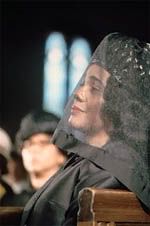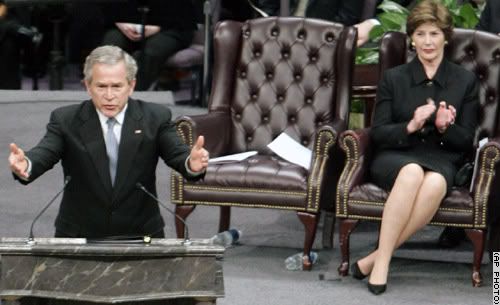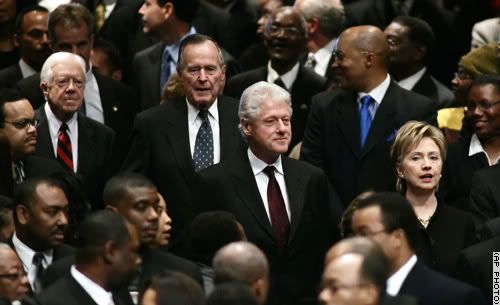Faith & Politics Mix At Coretta Scott King's Funeral
 Dr. Martin Luther King Jr. was roundly condemned for mixing politics and faith. "Just stick to preaching the Gospel and leave the politics to the rest of us" seemed to be what his many critics demanded.
Dr. Martin Luther King Jr. was roundly condemned for mixing politics and faith. "Just stick to preaching the Gospel and leave the politics to the rest of us" seemed to be what his many critics demanded.But for Dr. King, politics and faith went hand in hand or, even more accurately, politics sat under the judgment of faith and was accountable to the One who declared freedom and liberty to be an "unalienable right" for all people of all colors, rich and poor alike.
Today, at the funeral of his wife and widow, Coretta Scott King, Dr. King and his vision for a world blessed with peace and freedom for all was remembered and celebrated. Coretta was honored and eulogized as the good, Godly and almost iconic figure she became.
For all the faults in the lives of Dr. & Mrs. King, their greatest glory was how, when given a choice, they almost always chose the "high road" in getting their message across.
By this I mean that they proclaimed the vision of the way things ought to be. They lifted up the high ideals of the founding documents of the United States and grounded them on the Biblical foundations of justice, forgiveness, equality, freedom, hope, love and peace. "Look to the good," they seemed to say, "and the good will both judge and condemn the injustice and oppression that dwells among us."
 President Bush, in his brief presentation, took that same high road, extolling Coretta for her faithfulness to the vision of her husband that has made our country a far better place than it had been before. He referenced God, Moses, the Old Testament prophets and, without using the name, the guiding hand of the Lord Jesus Christ in world events. Given the church setting his words were uplifting, positive and uniting.
President Bush, in his brief presentation, took that same high road, extolling Coretta for her faithfulness to the vision of her husband that has made our country a far better place than it had been before. He referenced God, Moses, the Old Testament prophets and, without using the name, the guiding hand of the Lord Jesus Christ in world events. Given the church setting his words were uplifting, positive and uniting. Those who followed, at least for the most part, followed the same high road. But there were noticeable exceptions. Regrettably, one of them was Jimmy Carter, one of three former presidents to be present (the other two being the elder George Bush and Bill Clinton).
Those who followed, at least for the most part, followed the same high road. But there were noticeable exceptions. Regrettably, one of them was Jimmy Carter, one of three former presidents to be present (the other two being the elder George Bush and Bill Clinton).Carter, who has apparently adopted the worldview of the international elite and deluded into thinking that he speaks on behalf of the poor, the oppressed and the Arab Muslim "street" injected two sour notes in his presentation.
The first contained a "low road, low blow" at the current Bush administration when he said, "It was difficult for (Dr. & Mrs. King) personally, with the civil liberties of both husband and wife violated as they became the target of secret government wiretapping."
This not-so-subtle reference to the current NSA terrorist communication warrantless intercept program brought thunderous applause from the politically partisan gathering. A "cheap shot" at the man who had come to represent the American people at a national event honoring a national figure. On an occasion such as this, a partisan attack on the President is nothing less than an attack and an insult on the entire nation. For shame!
Later, according to a Fox News/AP story, "(Carter) said that Hurricane Katrina showed all are not yet equal in America, and made a veiled reference to the war in Iraq and the existing government's international strategies."
A second "low road" comment came from Joseph Lowery who, with Dr. King, had founded the Southern Christian Leadership Conference.
"We know now there were no weapons of mass destruction over there," he said in a boisterous, rhyming oration. "But Coretta knew and we know that there are weapons of misdirection right down here -- millions without health insurance, poverty abounds. For war, billions more, but no more for the poor."
If the "high road" had been taken these anti-Bush slams could have been transformed into remembrances of just how far we have come and into visions of just how far we still need to go.
Even so, a smiling and gracious President Bush reportedly rose and gave Lowery a warm embrace following his eulogy.
The irony is that, at the funeral service for the widow of Dr. Martin Luther King Jr., it was those pretending to represent the legacy of Dr. King's non-violence who struck out with anger at the President of the United States.
But it was President Bush who quietly took the blows and turned the other cheek.


<< Home